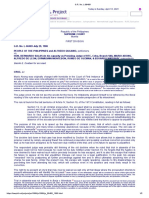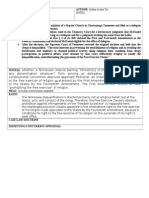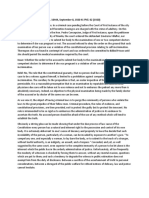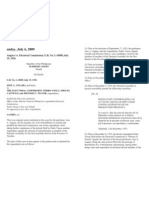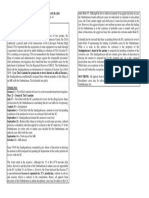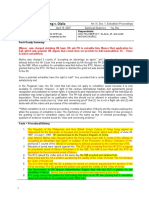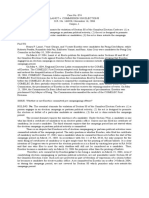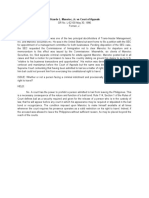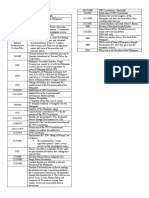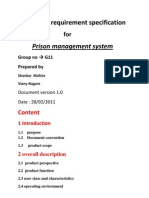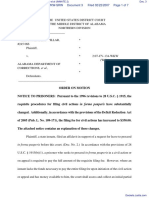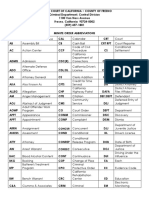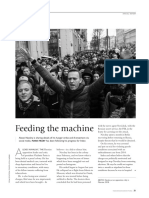Govt of HK Vs Hon Olalia
Govt of HK Vs Hon Olalia
Uploaded by
Katherine KuaCopyright:
Available Formats
Govt of HK Vs Hon Olalia
Govt of HK Vs Hon Olalia
Uploaded by
Katherine KuaOriginal Title
Copyright
Available Formats
Share this document
Did you find this document useful?
Is this content inappropriate?
Copyright:
Available Formats
Govt of HK Vs Hon Olalia
Govt of HK Vs Hon Olalia
Uploaded by
Katherine KuaCopyright:
Available Formats
Government of Hong Kong Special Administrative Region
vs Hon. Felixberto T. Olalia, Jr. and Juan Antonio Muñoz
GR. No. 153675 April 19, 2007
Sandoval-Gutierrez, J.
FACTS:
Juan Antonio Muñoz was charged with 3 counts of “accepting an advantage as agent”,
and 7 counts of conspiracy to defraud, punishable by the common law of Hong Kong. The Hong
Kong Department of Justice requested DOJ for the provisional arrest of Muñoz; the DOJ
forward the request to the NBI then to RTC. On the same day, NBI agents arrested him.
Muñoz filed with the CA a petition for certiorari, prohibition and mandamus with
application for preliminary mandatory injunction and writ of habeas corpus questioning the
validity of the order of arrest. The CA declared the arrest void. DOJ filed a petition for certiorari
in this Court and sustained the validity of the arrest.
Hongkong Administrative Region then filed in the RTC petition for extradition and arrest
of Muñoz. Meanwhile, Muñoz filed a petition for bail, which was opposed by the DOJ, initially the
RTC denied the petition holding that there is no Philippine Law granting bail in extradition cases
and that private responded is a “flight risk”. Muñoz filed for a motion for reconsideration which
was granted.
ISSUE: Whether or not right to bail can be available in extradition cases?
HELD:
In Purganan case, the right to bail was not included in the extradition cases, since it is
available only in criminal proceedings. However the Supreme Court recognized the modern
trend in the public international law wherein primacy is placed on the sanctity of human rights.
Enshrined in the Constitution “The state values the dignity of every human person and
guarantees full respect for human rights.” The Philippines therefore, has the responsibility of
protecting and promoting the right of every person to liberty and due process, ensuring that
those detained or arrested can participate in the proceeding before the a court, to enable it to
decide without delay on the legality of the detention and order their release if justified.
EXTRADITION, is defined as the removal of an accused from the Philippines with the object of
placing him at the disposal of foreign authorities to enable the requesting state or government to
hold him in connection with criminal investigation directed against him or execution of a penalty
imposed on him under the penal and criminal law of the requesting state or government. Thus,
characterized as the right of the a foreign power, created by treaty to demand the surrender of
one accused or convicted of a crimes within its territorial jurisdiction and the correlative
obligation of the other state to surrender him to the demanding state. The extradited may be
subject to detention as may be necessary step in the process of extradition, but the length of
time in the detention should be reasonable.
In the case at bar, the record show that Muñoz has been detained for 2 years without being
convicted in Hong Kong. The Philippines has the obligation of ensuring the individual his right to
liberty and due process and should not therefor deprive the extraditee of his right to bail
provided that there should be “CLEAR AND CONVINCING EVIDENCE”. However, in the case
at bar, Muñoz was not able to show and clear and convincing evidence that he be entitled to
bail. The case is remanded in the court for the determination and otherwise, should order the
cancellation of his bond and his immediate detention.
You might also like
- G.R No. L-66469Document2 pagesG.R No. L-66469Edwino Nudo Barbosa Jr.No ratings yet
- McDaniel Vs PatyDocument1 pageMcDaniel Vs PatyArthur Archie TiuNo ratings yet
- People Vs Bolanos 211 SCRA 262Document3 pagesPeople Vs Bolanos 211 SCRA 262MWinbee VisitacionNo ratings yet
- COA v. Ferrer G.R. No. 218870Document7 pagesCOA v. Ferrer G.R. No. 218870Emer May BalleteNo ratings yet
- Labao v. Flores G.R. No. 187984Document5 pagesLabao v. Flores G.R. No. 187984Emer May BalleteNo ratings yet
- Digest - Samson Vs DawayDocument1 pageDigest - Samson Vs DawayUnknown userNo ratings yet
- Abagatnan V Sps ClaritoDocument7 pagesAbagatnan V Sps ClaritoSecret SecretNo ratings yet
- People V ZuelaDocument12 pagesPeople V ZuelaOlek Dela CruzNo ratings yet
- G.R. No. 118861Document11 pagesG.R. No. 118861shienna baccayNo ratings yet
- SSC vs. AzoteDocument14 pagesSSC vs. AzoteInna LadislaoNo ratings yet
- Office of The Ombudsman V ENOCDocument2 pagesOffice of The Ombudsman V ENOCTrixie PeraltaNo ratings yet
- In Re Rodulfo ManzanoDocument8 pagesIn Re Rodulfo ManzanoSar FifthNo ratings yet
- de Buncio & Co. Vs Ong Guan GanDocument2 pagesde Buncio & Co. Vs Ong Guan GanZahraMinaNo ratings yet
- 2 Full CasesDocument100 pages2 Full CasesCzarina BantayNo ratings yet
- Pascual v. BOEDocument1 pagePascual v. BOEPnp Ifugao HingyonNo ratings yet
- Villaflor vs. SummersDocument1 pageVillaflor vs. SummersAname BarredoNo ratings yet
- Secretary of Justice vs. Lantion, 343 SCRA 377, October 17, 2000 Case DigestDocument1 pageSecretary of Justice vs. Lantion, 343 SCRA 377, October 17, 2000 Case DigestElla Kriziana CruzNo ratings yet
- DIGEST - Antone v. BeronillaDocument2 pagesDIGEST - Antone v. BeronillaThe FlipNo ratings yet
- Tamano V RepublicDocument3 pagesTamano V Republic8LYN LAWNo ratings yet
- People v. NitchaDocument12 pagesPeople v. NitchaemyNo ratings yet
- Dual Function of The Appellate CourtDocument3 pagesDual Function of The Appellate CourtlucilleeNo ratings yet
- People v. Garcia G.R. No. L-30449Document8 pagesPeople v. Garcia G.R. No. L-30449Anna Kristina Felichi ImportanteNo ratings yet
- Right To Be Heard by Himself and Counsel PEOPLE VS. HOLGADO (85 PHIL 752 G.R.L-2809 22 MAR 1950)Document35 pagesRight To Be Heard by Himself and Counsel PEOPLE VS. HOLGADO (85 PHIL 752 G.R.L-2809 22 MAR 1950)Yasser AureadaNo ratings yet
- (CD) Liang v. People - G.R. No. 125865 - AZapantaDocument1 page(CD) Liang v. People - G.R. No. 125865 - AZapantaThe Concerned LawstudentNo ratings yet
- Admin MidtermsDocument262 pagesAdmin MidtermsKay Ann J GempisNo ratings yet
- US v. NixonDocument4 pagesUS v. NixonSnowflake88No ratings yet
- Judiciary #36-41Document6 pagesJudiciary #36-41Mythel SolisNo ratings yet
- Topic Date: Criminal Procedure 2EDocument2 pagesTopic Date: Criminal Procedure 2EJasenNo ratings yet
- People Vs LabaoDocument5 pagesPeople Vs LabaoDaf MarianoNo ratings yet
- 27 Golofa v. SingDocument2 pages27 Golofa v. SingPaolo AlarillaNo ratings yet
- Case Digest 2Document4 pagesCase Digest 2ronaldsatorre.15No ratings yet
- Cases 20-23 CrimproDocument6 pagesCases 20-23 CrimproAllen Villanueva BautistaNo ratings yet
- LIM Vs FelixDocument9 pagesLIM Vs FelixAllen OlayvarNo ratings yet
- US Vs Tang Ho Example Case For AdminDocument2 pagesUS Vs Tang Ho Example Case For AdminCheska LesacaNo ratings yet
- Government of Hongkong v. Olalia, 521 SCRA 470 (2007) : Sec. 13. Bail IDocument2 pagesGovernment of Hongkong v. Olalia, 521 SCRA 470 (2007) : Sec. 13. Bail Imaanyag6685No ratings yet
- Consti CasesDocument610 pagesConsti CasesWilson SantosNo ratings yet
- California v. Hodari D., 499 U.S. 621 (1991)Document23 pagesCalifornia v. Hodari D., 499 U.S. 621 (1991)Scribd Government DocsNo ratings yet
- People vs. Lovedioro 250 SCRA 389Document16 pagesPeople vs. Lovedioro 250 SCRA 389Maricar VelascoNo ratings yet
- Castro Vs CA (1989)Document3 pagesCastro Vs CA (1989)Anonymous e3d4NYgnNKNo ratings yet
- Miranda V TuliaoDocument17 pagesMiranda V Tuliaodee_roldan5278No ratings yet
- GR No. 158763 March 31, 2016 Jose C. Miranda, Alberto P. Dalmacio and Romeo B. Ocon vs. Virgilio M. Tuliao FactsDocument2 pagesGR No. 158763 March 31, 2016 Jose C. Miranda, Alberto P. Dalmacio and Romeo B. Ocon vs. Virgilio M. Tuliao FactsAnalou Agustin VillezaNo ratings yet
- Case Digest - Video Coverage of Ampatuan CaseDocument2 pagesCase Digest - Video Coverage of Ampatuan Caserobert gapasangraNo ratings yet
- Case 8 PEOPLE Vs SIONDocument1 pageCase 8 PEOPLE Vs SIONapril rose ticarNo ratings yet
- Ang v. AngDocument2 pagesAng v. AngAnna VeluzNo ratings yet
- Casupanan Vs LaroyaDocument16 pagesCasupanan Vs LaroyaAntoniete C. BacusNo ratings yet
- Palana Vs PeopleDocument12 pagesPalana Vs PeopleDili Si ShanNo ratings yet
- Alano V CA PDFDocument6 pagesAlano V CA PDFKarl Justeen DavidNo ratings yet
- Romualdez and Aquino Residency CaseDocument3 pagesRomualdez and Aquino Residency CaseThessaloe May FernandezNo ratings yet
- Bernardo vs. CA, 278 SCRA 782Document17 pagesBernardo vs. CA, 278 SCRA 782Guiller MagsumbolNo ratings yet
- OritaDocument1 pageOritabryan06perezNo ratings yet
- Tirol vs. SandiganbayanDocument1 pageTirol vs. SandiganbayanCamillaGalang100% (1)
- Issue:: Gonzales vs. ComelecDocument10 pagesIssue:: Gonzales vs. ComelecblimjucoNo ratings yet
- PP VS Edgar ConcilladoDocument9 pagesPP VS Edgar ConcilladoSean ArcillaNo ratings yet
- Defensor-Santiago v. Vasquez, 217 SCRA 663Document18 pagesDefensor-Santiago v. Vasquez, 217 SCRA 663aitoomuchtvNo ratings yet
- People v. Givera, G.R. No. 132159, January 18, 2001 PDFDocument40 pagesPeople v. Givera, G.R. No. 132159, January 18, 2001 PDFJohzzyluck R. MaghuyopNo ratings yet
- Government of Hongkong Vs OlaliaDocument2 pagesGovernment of Hongkong Vs OlaliaKim Lorenzo CalatravaNo ratings yet
- 5 Gov - T of Hongkong v. OlaliaDocument3 pages5 Gov - T of Hongkong v. OlaliaCarl IlaganNo ratings yet
- Government of Hong Kong Special Administrative Region v. Olalia JR., G.R 153675, Apr. 19, 2007 DigestDocument2 pagesGovernment of Hong Kong Special Administrative Region v. Olalia JR., G.R 153675, Apr. 19, 2007 DigestzanjknightNo ratings yet
- Gov of HK Vs OlaliaDocument2 pagesGov of HK Vs OlaliaMilcah Mae PascualNo ratings yet
- Government of Hongkong vs. OlaliaDocument1 pageGovernment of Hongkong vs. OlaliaKling KingNo ratings yet
- LANOT v. COMMISSION ON ELECTIONSDocument1 pageLANOT v. COMMISSION ON ELECTIONSKatherine KuaNo ratings yet
- REGIDOR v. CHIONGBIANDocument1 pageREGIDOR v. CHIONGBIANKatherine KuaNo ratings yet
- Aquino Vs DelizoDocument1 pageAquino Vs DelizoKatherine KuaNo ratings yet
- Manotoc Vs CADocument1 pageManotoc Vs CAKatherine KuaNo ratings yet
- 1987 PH Constitution HistoryDocument1 page1987 PH Constitution HistoryKatherine KuaNo ratings yet
- Cause and Effect: M. Rafli Syahputra Xii Ips 2 Absen 18Document3 pagesCause and Effect: M. Rafli Syahputra Xii Ips 2 Absen 18avika anjaniNo ratings yet
- (Sec 31 CRPC) LawFinder - 632086Document9 pages(Sec 31 CRPC) LawFinder - 632086roopan.sachdevaNo ratings yet
- Renacia Unit 2 Pretest and Activity 1Document3 pagesRenacia Unit 2 Pretest and Activity 1Erickajean Cornelio LabradorNo ratings yet
- Arguments Board Game (Classic) : StartDocument4 pagesArguments Board Game (Classic) : StartInk Pen EraserNo ratings yet
- Batman Begins - RichmondDocument7 pagesBatman Begins - RichmondGeovana BatistaNo ratings yet
- Presentation Slides - Justin Piché - Symposium On Prison Crowding and Human RightsDocument21 pagesPresentation Slides - Justin Piché - Symposium On Prison Crowding and Human RightsJustin PichéNo ratings yet
- DrusillaDocument143 pagesDrusillaSu ZhiNo ratings yet
- Administrative Duties and Responsibilities of Bucor, BJMPDocument19 pagesAdministrative Duties and Responsibilities of Bucor, BJMPTorogi TV100% (1)
- Reflection-Paper (Ganito Kami Noon-Paano Kayo Ngayon)Document1 pageReflection-Paper (Ganito Kami Noon-Paano Kayo Ngayon)Jessica Tulagan BarbozaNo ratings yet
- Prison Management System SrsDocument6 pagesPrison Management System SrsTфmmy Wilmark50% (2)
- Sibick LetterDocument40 pagesSibick LetterWGRZ-TVNo ratings yet
- BateDocument10 pagesBateHenry Y. SyNo ratings yet
- LT Governor Re Patricia Wright 6.12.2020Document5 pagesLT Governor Re Patricia Wright 6.12.2020Ethan BrownNo ratings yet
- Test Bank For Organizational Behavior 15th Edition Robbins A.judge 013283491X 9780132834919Document36 pagesTest Bank For Organizational Behavior 15th Edition Robbins A.judge 013283491X 9780132834919AndreWashingtonbmfne100% (34)
- Thesis Statement On Social IssuesDocument4 pagesThesis Statement On Social IssuesOrderCustomPapersSiouxFalls100% (2)
- Villar v. Alabama Department of Corrections Et Al (INMATE 2) - Document No. 3Document7 pagesVillar v. Alabama Department of Corrections Et Al (INMATE 2) - Document No. 3Justia.comNo ratings yet
- FilesDocument3 pagesFilesAlexis CapilatoNo ratings yet
- 29 US Vs BautistaDocument2 pages29 US Vs BautistaVal SanchezNo ratings yet
- Go vs. Dimagiba 460 SCRA 451, June 21, 2005 PDFDocument17 pagesGo vs. Dimagiba 460 SCRA 451, June 21, 2005 PDFClaribel Domingo BayaniNo ratings yet
- Rizal LifeDocument20 pagesRizal LifeAlyssa Maven MacatoNo ratings yet
- Exercise For Types of SentencesDocument3 pagesExercise For Types of SentencesShazil EjazNo ratings yet
- Habeas Corpus Juvenile Justice ActDocument29 pagesHabeas Corpus Juvenile Justice ActRamesh Babu TatapudiNo ratings yet
- (FREE PDF Sample) Criminal Reform Prisoner Reentry Into The Community 1st Edition Quintan B. Mallenhoff EbooksDocument60 pages(FREE PDF Sample) Criminal Reform Prisoner Reentry Into The Community 1st Edition Quintan B. Mallenhoff Ebooksnzamaozbej100% (10)
- Frary 2021 Feeding The MachineDocument3 pagesFrary 2021 Feeding The Machinepoli.paredes14No ratings yet
- Willson v. Curry PHCDocument5 pagesWillson v. Curry PHCNorthern District of California BlogNo ratings yet
- May 1 2021 Tim Johnson DWI Guilty PleaDocument5 pagesMay 1 2021 Tim Johnson DWI Guilty PleaJoe BowenNo ratings yet
- USA V BILLINGSLEY Aug 13th Conditions of ReleaseDocument3 pagesUSA V BILLINGSLEY Aug 13th Conditions of ReleaseFile 411No ratings yet
- Modul 6Document2 pagesModul 6Ajat SudrajatNo ratings yet
- Reviewer CADocument20 pagesReviewer CALuckyjames FernandezNo ratings yet
- Critical Thinking AssignmentDocument8 pagesCritical Thinking Assignmentapi-536721507No ratings yet
